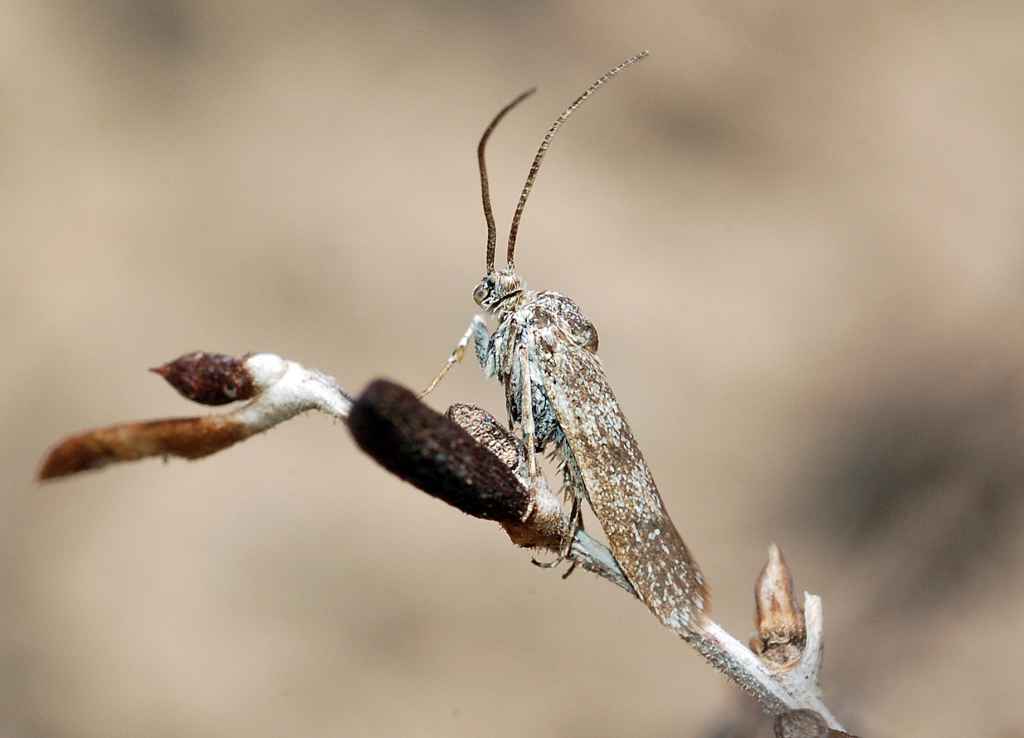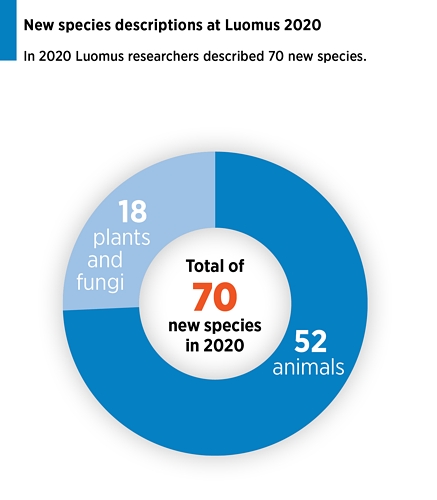RESEARCH NOW
Luomus conducts research on biodiversity and how to prevent its loss. The core of the research is focused on the analysis of biodiversity and its evolution in Finland and the world.
Together with other research institutions, the researchers at Luomus study how organisms react to the ongoing climate change and have adapted to climate changes in the past. The focus of research also covers the adaptation to human-caused habitat changes. For example, many of the bird studies published in 2019 and 2020 noted that bird populations in Finland had changed due to climate change and land-use changes. The Laboratory of Chronology studies climates in the past, the effects of the ongoing climate change and how to mitigate it.
New species

Photo: Pavel Gorbunov
Of the approximately 9 million species living in the world, less than 2 million are known to science. However, most new species are not uncovered deep in a tropical rainforest, but in the collection archives of museums. This means that new species are not strictly undiscovered. More commonly, new discoveries are made when two specimens previously thought to be one species are found to be two separate species. In 2019–2020 Luomus researchers determined the evolutionary history of several species groups and created more than 171 new species descriptions (Table 10) along with several higher taxa, genera and even one family.

New research projects
Luomus houses a research and education group tasked with the long-term development of research from the standpoint of the whole institute. In 2019–2020, Luomus had several ongoing new research projects, a few of which are listed below.
- Laura Arppe received funding from the Academy of Finland for the project Fungus-growing termites, their interaction with the ecosystem and the paleoecological potential of old termite mounds.
- The research project, The speciation of bryophilous lichen – The interaction between reproduction factors and habitat requirements started in 2019, is funded by the Academy of Finland and is led by Leena Myllys.
- The project The key habitats for threatened and poorly known lichens, led by Leena Myllys,was in 2020 accepted for the research program PUTTE II, which is a program of poorly known and threatened species and nature types, and is led by the Ministry of the Environment.
- Marko Hyvärinen received a four-year funding from the Academy of Finland in 2020 for the project Can plants survive a changing climate with the help of their adaptive plasticity and evolutionary potential?.
- Thomas Lilley received a five-year funding in 2020 for the project The evolutionary effects of a fungal disease on bats. He also leads the consortium project The effect of climate change on dynamics of zoonoses in migratory birds and bats across Europe, which received funding in 2019 from the Academy of Finland’s funding program Climate change and health. The other responsible researchers in the consortium are Aleksi Lehikoinen from Luomus and Arto Pulliainen from the University of Turku.
- The project Microplastics in aquatic insects and the movements of microplastics through the food chain – the natural history collections and monitoring data as support for environmental threats that started in 2019 is led by Maria Heikkilä and received funding from the Kone Foundation.
- Aleksi Lehikoinen received funding from the Academy of Finland in 2019 for the project Changes in species communities: climate changes, land-use and the complexity of communities.
- Pedro Cardoso’s research group received a new PhD student, Vasco Branco, who will start working with the project Asterisk: automated assessment of species extinction risk, that was funded by Kone Foundation.
- The project The mechanisms of biodiversity in a species-rich group of insects, started in 2020, is led by Pasi Sihvonen and was funded by the Academy of Finland.
- The research group led by Sergei Tarasov started its work with two projects in 2020: To understand the speciation mechanisms in a tropical environment by combining analysis of large data sets with new fylogenetic approaches (funded by the Academy of Finland) and Unrolling mechanisms of species diversifications using novel phylogenetic methods (funded by the University of Helsinki).